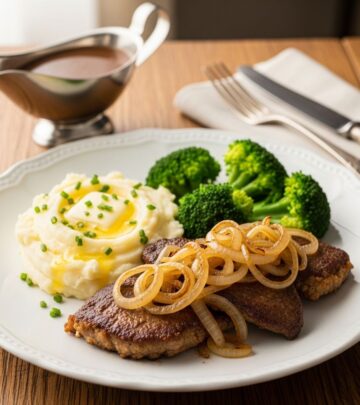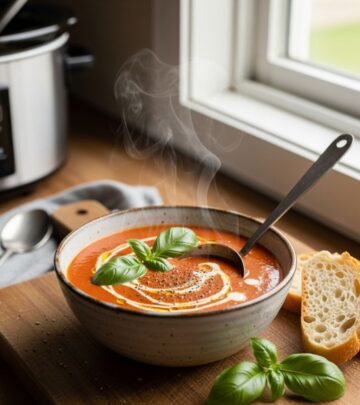Lemon Pepper Chicken: Zesty, Savory, and Perfect Every Time
A vibrant homemade lemon pepper chicken that's bursting with fresh citrus and bold, peppery flavor.

Lemon pepper chicken is an iconic dish, celebrated for its bold pepperiness, bright citrus zing, and tender, juicy chicken at its core. While pre-blended lemon pepper seasoning is readily available at supermarkets, crafting your own blend and thoughtfully layering flavors at each step make an extraordinary difference. This comprehensive guide walks you through the process of building those flavors from scratch, ensuring every bite bursts with savory sunshine and aromatic spice.
Why Make Lemon Pepper Chicken at Home?
- Freshness First: Homemade seasoning blends spotlight real lemon zest and coarsely cracked black pepper, delivering more punch and vibrant aromatics than any pre-mixed jar.
- All-Natural Ingredients: Control what goes into your seasoning by using actual citrus and whole spices—no anti-caking agents or fillers.
- Balanced Flavors: Lemon and black pepper enhance chicken’s inherent savoriness rather than dominate, making it universally appealing.
- Customizable: Adjust the lemony or peppery notes to suit your preferences. Prefer extra zing or a little more heat? You’re the chef.
- Versatility: This dish can be served as a weeknight main, sliced over salads, in sandwiches, or as party fare.
The Heart of the Recipe: Homemade Lemon Pepper Seasoning
The secret to outstanding lemon pepper chicken is crafting a seasoning blend from scratch, rather than using shelf-stable versions. Here’s how to do it right:
- Fresh Lemon Zest: Only freshly grated zest will impart the essential floral-citrusy punch.
- Coarsely Cracked Black Pepper: For that robust bite and appealing texture, crack whole peppercorns yourself if possible.
- Salt: Use kosher salt for maximum flavor absorption during the seasoning process.
Once your blend is prepped, flavor development continues as it mingles with the chicken: marinating, searing, and creating a punchy pan sauce utilizing both lemon juice and zest.
Essential Ingredients
| Ingredient | Description | Role in Recipe |
|---|---|---|
| Chicken | Boneless, skinless chicken breasts or thighs | Main protein; absorbs flavors thoroughly |
| Lemon Zest | Freshly grated from bright lemons | Provides citrus oils and floral aroma |
| Black Pepper | Freshly cracked whole peppercorns | Adds heat and bold aromatic lift |
| Lemon Juice | Freshly squeezed | Brightens pan sauce and adds lively tang |
| Kosher Salt | Preferred for even seasoning | Key for flavor development |
| Butter (optional) | Adds a creamy finish to the sauce | Balances acidity with richness |
| Neutral Oil | Canola or vegetable oil | For searing the chicken to golden perfection |
| Broth or Water | Optional for deglazing pan | Builds a silky pan sauce |
Step-by-Step: Crafting Perfect Lemon Pepper Chicken
1. Make Fresh Lemon Pepper Seasoning
- Grate the zest from two lemons, taking care to avoid the bitter white pith.
- Crack whole black peppercorns using a mortar and pestle or the bottom of a pan until you have about two tablespoons of coarse pepper.
- Mix zest and pepper with kosher salt. Use immediately for maximum flavor.
2. Prepare the Chicken
- Pat chicken pieces dry to ensure thorough searing.
- Pound chicken breasts to even thickness if using breasts, which ensures even cooking.
- Liberally season all sides with your homemade lemon pepper blend.
3. Sear the Chicken
- Heat a tablespoon of neutral oil in a large skillet over medium-high heat until shimmering.
- Sear chicken pieces undisturbed until deep golden brown on the first side (around 4-5 minutes), then flip and finish cooking until the internal temperature hits 155–160°F (68–71°C).
- Transfer chicken to a plate and tent gently with foil.
4. Build a Zesty Pan Sauce
- With the pan still hot, add a little broth or water to deglaze and scrape up any flavorful bits.
- Squeeze in fresh lemon juice and add a knob of butter to emulsify the sauce.
- Simmer and reduce the sauce slightly, then return the chicken along with some freshly grated lemon zest.
- Swirl and spoon sauce over chicken before serving.
Tips for Maximum Flavor and Perfect Texture
- Use Fresh Ingredients: Dried lemon zest and pre-ground pepper always lack the vibrancy of fresh. It’s worth the minimal extra effort.
- Don’t Overcook: Pull chicken as soon as it’s just done, letting carryover heat finish the rest. Overdone chicken loses juiciness and flavor.
- Rest the Chicken: Allowing meat to rest redistributes the juices and keeps it moist.
- Layer Flavors: Season every step—from raw chicken to the final pan sauce—with more zest and pepper if desired. Lemon’s acidity brightens, but too much can overwhelm, so taste as you go.
- Add Finishing Touches: A sprinkle of chopped parsley or extra lemon zest just before serving adds color and a final hit of freshness.
Choosing the Right Chicken
Both boneless, skinless breasts and thighs work beautifully with lemon pepper chicken. Here’s how they compare:
| Type | Pros | Cons |
|---|---|---|
| Chicken Breasts | Lean, easy to slice, soak up flavors quickly | Can dry out if overcooked |
| Chicken Thighs | Moister, slightly richer taste, forgiving to cook | Contain a bit more fat |
Tip: For very tender and flavorful results, you may brine the chicken briefly (about 30 minutes in a saltwater solution) before seasoning.
Serving Suggestions and Variations
- Classic Plating: Serve with mashed potatoes, rice, or a hearty grain, and a side of green beans or asparagus.
- As a Salad Topper: Slice lemon pepper chicken onto leafy salads mixed with arugula, cherry tomatoes, and a lemony vinaigrette.
- Sandwiches & Wraps: Use leftovers in ciabatta or pita with crisp lettuce, cucumbers, and a creamy yogurt sauce.
- Add Garlic or Herbs: Toss in a minced garlic clove or a sprinkle of fresh thyme or rosemary during the sauce-making step for extra aromatics.
- Make it Spicy: Add a pinch of crushed red pepper flakes if more heat is desired.
- Sheet Pan Option: For larger crowds, arrange seasoned chicken on a sheet pan and roast at 425°F until cooked through, optionally adding sliced lemons for garnish.
Storing, Reheating, and Meal Prep
- To Store: Cool leftovers, then refrigerate in an airtight container for up to 4 days.
- To Reheat: Gently warm chicken in a covered skillet or microwave with a splash of water or broth to maintain moisture.
- Freezing: Lemon pepper chicken freezes well for up to 2 months. Thaw in the refrigerator before reheating.
- Meal Prep: Portion cooked chicken with grains and veggies in containers for easy weekday lunches.
Frequently Asked Questions (FAQs)
Q: Can I use store-bought lemon pepper seasoning instead of making my own?
A: Yes, but homemade seasoning delivers a much brighter flavor and fresher aroma. If using store-bought, taste and adjust for extra zest and cracked pepper.
Q: Can this recipe be made with bone-in chicken pieces?
A: Absolutely. Simply adjust cooking times upward to ensure thorough doneness. Sear as directed, then finish in the oven if needed.
Q: Is it possible to grill lemon pepper chicken?
A: Yes, this recipe adapts well to the grill. Marinate and season chicken, grill over medium heat, then finish with a squeeze of lemon and more cracked pepper.
Q: What’s the best way to zest a lemon for seasoning?
A: Use a microplane or fine-toothed rasp for the thinnest, most aromatic zest, avoiding too much of the white pith underneath which is bitter.
Q: Can I double the lemon pepper seasoning and store it?
A: Yes, but use it within a couple of weeks, keeping it in an airtight container and away from light to maintain citrus potency.
Conclusion: Elevate Your Lemon Pepper Chicken
With freshly cracked pepper, vibrant lemon, and juicy chicken at its heart, homemade lemon pepper chicken offers an incredible upgrade over takeout—or any bottled seasoning blend. Layer flavors at every stage and finish off with a lively pan sauce, and you’ll have a dish sure to impress and satisfy all palates. Enjoy it for a quick weeknight dinner, meal prep staple, or the centerpiece at your next gathering. Citrus and spice have never looked (or tasted) better!
Read full bio of medha deb












